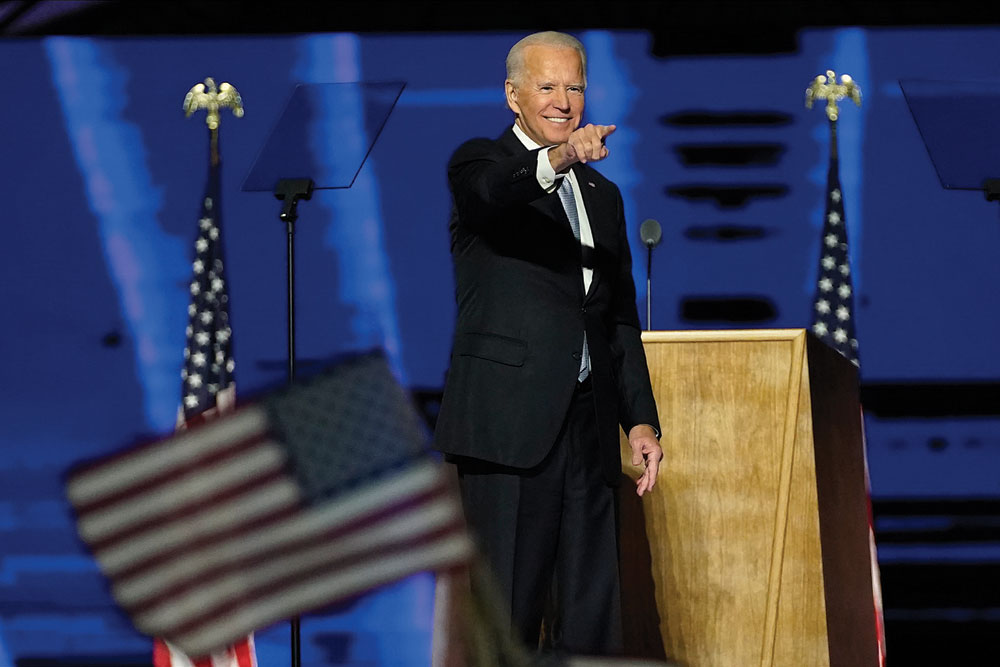Terra Infirma
What still mattered most was how the US and China dealt with each other
 Sudeep Paul
Sudeep Paul
 Sudeep Paul
Sudeep Paul
 |
18 Dec, 2020
|
18 Dec, 2020
/wp-content/uploads/2020/12/TerraInfirma1.jpg)
(Illustration: Saurabh Singh)
I know that I am alive
between two parentheses.
— Octavio Paz
2020 ran out of time wrapped in two uncertainties. Rather, variations on the self-same uncertainty: US-China and the pandemic. The year was a qualitative departure, not just a difference in degree or magnitude. A cataclysm befell the globe, making metaphors redundant. It spread from one city and affected most of humanity.
By the time December was here, we had forgotten that the year had begun with the death of 500 million animals. Ironically, the UN had declared 2020 the International Year of Plant Health.
Tempting as it is to see the Australian bushfires that heralded the year as symbolic of a universe out of joint (they had actually started in mid-2019 and lasted almost a year), the bushfires became a footnote in the Year of the Rat that brought the plague. Not one of the Sustainable Development Goals was met. Climate change action apparently had its worst year on record. Who’d have seen that one coming when everything had shut down, triggering the worst global recession since the Great Depression? As we talked about paradigms shifting, the year, aping the human compulsion to impose order on chaos, overdid its patterns. Take this pair of parentheses: On January 3rd, Qasem Soleimani, commander of the Islamic Revolutionary Guards Corps’ Quds Force, was assassinated. On November 27th, Mohsen Fakhrizadeh, top-dog nuclear scientist and a brigadier-general in the Revolutionary Guards, was eliminated. If Soleimani died in a precision drone strike, Fakhrizadeh was killed by a ‘machine-gun with AI’. From the beginning of the year to its end, the world had changed in many details. Somewhere in the midst of it all, Africa freed itself of wild polio. And 2020 took John le Carré before it ended.
Pivoting on the pandemic, however, certain near-certainties evaporated. In the first quarter, Donald Trump was riding the economy to re-election, strengthened by an impeachment by the House and a foregone acquittal by the Senate. But as booths and ballots were dared across Europe, Africa and Asia, the results of the year’s biggest election—after a historic demonstration of what going down to the wire means—delivered America’s oldest president-elect to his first term. The end-parenthesis of 2020 thus became a question: How much of the world as changed by Trump for the better will survive through 2021? And its obverse: How much of America as changed under Trump for the worse will heal itself? India would have been spared its terrible uncertainty on the first count had the pandemic not wrecked the ‘Trump boom’. And yet, in a year of readymade signs of the apocalypse, a Black man died under the knee of a white policeman in America’s 46th city almost at the midpoint of the year. Not an uncommon American reality, except it was crowd-shot and crowd-sourced across the eighth continent. Perhaps it was at that midpoint of 2020 that the Trump presidency ended.
In a year defined by a pandemic for the first time in a century, the US presidential election was the supreme instance of the persistence of the species. Bihar’s Assembly elections, India’s first after lockdown, could well compete, but then in Trump’s curtailment, the US not fighting a new war through an entire presidential term—and yet intervening, often surgically, in places it needed to but wouldn’t under another president—could be coming to an end. Is it for this reason that those who would be smirking in Beijing have been cautious in congratulating Joe Biden? Or holding their breath, expecting America to overinvest in a bloodbath soon? Biden, set to be the 46th president, isn’t of course talking any more of letting China eat America’s lunch, let alone doubting China eats anybody’s lunch. But the end-uncertainty is just that: Whither the solid Made-in-America wall that Trump had built for India? Perhaps they would be more worried in Taipei, with talk of an invasion every other day, but for the fatal skirmish in eastern Ladakh. Will Canberra have the strength of mind (and pocket) hereafter to stay on in the Quad? Or will the Quad be watered down from the Eastern Seaboard after January 20th? Can Russia, primordial and Petersburgian instincts notwithstanding, expect Washington not to obsess about Moscow once again and look elsewhere despite evidence of big-ticket hacking?

Uncertainty hangs over the Middle East too. No matter how much Binyamin Netanyahu tries to couch it in diplomatic correctness. If the saddest story from West Asia and North Africa was Beirut almost being wiped off the map, the biggest was not so much Iran and the assassinations, or the downing of Ukrainian International Airlines’ Flight 752 by an Iranian missile (in which 176 people died), or the Saudi intervention in Yemen and Libya. On November 10th, Israel and Morocco established diplomatic relations, Israel’s fourth with a Muslim nation since September when the UAE and Bahrain normalised relations with it, followed by Sudan the next month. Maybe this was Trump’s last triumph in a foreign policy that ended America’s pursuit of the persistent practice of ‘liberal hegemony’ on the one hand and delivered results on the ground that no US presidential administration had—and at such rapid succession—on the other. While across the border from Rafah to Eilat, Egypt became more authoritarian than ever in recent memory, perhaps the most significant steps towards long-term peace in the Middle East since the Camp David Accords were taken in the middle of the pandemic. The Palestinians terminated their agreements, including the security deals, with Israel and the US, but then their Arab neighbours had long ago decided they had had enough. All of this, as the Knesset dissolves itself again and Israel prepares for the fourth parliamentary election in two years. (Israelis began the year getting ready to vote; they end the year getting ready to vote.)
On January 31st, the UK left the European Union (EU), triggering an 11-month transition period that ends on December 31st, with no extension on the cards as per EU laws. With one eye on Britain’s hard exit after its year-long experiments with itself and another on the carnage wrought by Covid, few noticed Serbia and Kosovo proceed with their economic normalisation agreements, doing a bit more to lay the Balkan ghosts to rest, even as Poland and Hungary ganged up on Germany and took Berlin before the year’s end. And yes, on March 1st, Luxembourg became the first country in the world to make its public transport free. Well, good for the Grand ol’ Duchy. But nothing has gone well for Emmanuel Macron for a while, not since he decided to discard the kid gloves for terrorists and vandals and double down on ‘Islamic separatism’ after what must have been a refresher course on laïcité.
2020 was nevertheless the year Europe redeemed itself even as it struggled to outlive the pandemic. Its redemption was the hard call it took in refusing to be an always obliging partner in Beijing’s neo-colonisation project, aka the Belt and Road Initiative (BRI) in this case. European scepticism about the BRI predates 2020 but it assumed a tangible shape as anger rose at the People’s Republic’s evident role in obfuscating the origins and trajectory of the virus in its early days.
It was the year Kim Jong-un went missing and the world couldn’t make up its mind whether his sister, Kim Yo-jong, was pretty and ruthless or pretty and evil. Do they wonder in Pyongyang if their last chance at becoming less abnormal is disappearing with Trump?
Across the Sea of Japan (or the East Sea as the South Koreans would call it) though, there was little scope for speculation. Japan’s longest-serving prime minister, Shinzo Abe, called it a day when the ulcerative colitis got to him again. A pragmatist abroad and a nationalist at home, Abe had done more than most to try and build workable alliances against the never-quite-peaceful rise of China and was instrumental in resurrecting the Quad. He loved India for reasons of his own and of his country, and he will be missed in South Block for a long time.
In another year, we would have made more of bushfires and bitcoin scams. Or the Afghan war crimes inquiry. Or Poland-Hungary bullying Germany. Or Kim Jong-Un disappearing. Or noted that Mount Everest had ‘grown’ again
On the banks of the Moskva, much happened besides the return of Sputnik. In January, Prime Minister Dmitry Medvedev and his government resigned. In July, Russians paved the way for Vladimir Putin to extend his presidency till 2036. And then, in November, reports surfaced of Volodya planning to step down as early as next year amid fears of Parkinson’s. It might still be possible to rule Russia without strongmen and vodka but not to pull it out of China’s orbit, given the sins of the West when all Moscow needed was a friend who meant well, 30-odd years ago. Even the pandemic couldn’t have changed that. (In Minsk though, Lukashenko has had it worse, with the protests nearing their eighth month now.)
It’s an understatement to label 2020 a year of mispredictions. Here’s the Eurasia Group’s list of top 10 global geopolitical risks published in Time magazine in early January: One, the US elections (a test for institutions and lawsuits dragging for months, all in a political vacuum); two, the US-China tech decoupling (moving beyond the $5 trillion sector and creating a permanent economic, business and cultural divide, the ‘Virtual Berlin Wall’); three, an explicit US-China clash; four, politicians under pressure asserting themselves at the expense of MNCs; five, in ‘Modi-fied’ India, the prime minister not backing down on Kashmir and CAA, leading to a ‘harsh government response’ in turn emboldening the opposition to corner Modi, leaving him little room for economic reforms; six, an increasingly assertive Europe stepping up the antitrust war on US tech giants, and this ‘more independent Europe’ leading to friction with both the US and China; seven, the politics of climate change putting ‘governments, investors, and society at large on a collision course with corporate decision-makers’; eight, the consequences of the failure of US policy towards Iraq, Iran and Syria leading to ‘deadly skirmishes’; nine, discontent in an increasingly polarised Latin America; and ten, Turkey and Erdogan.
In predicting India, there’s a universal instinct to go by hearsay instead of tabulating facts. (Another thing the pandemic didn’t change.) But none of these predictions, by itself, was unjustified. Nor has any been wide off the mark. And yet, they were mispredictions (except Erdogan who, among other things, reverted the Hagia Sophia to a mosque) because the Great Disruption was missing from the equation. Instead, the lasting images of 2020 were goats and leopards (or nilgais) where they shouldn’t be and of lockdown protests (including the aesthetics of protesting in a pandemic courtesy of Hong Kong) or virtual summits. The biggest headlines were vaccine wars. Even the trade war, oil-price battles, bans on Chinese apps, and hair-splitting over supply chains were eclipsed by the WHO’s fall from grace. The year’s most desperately awaited news, if you were not an anti-vaxxer, came in November—the ‘success’ of the Phase 3 vaccine trials. In another year, we would have made more of Twitter-hacking connected to Bitcoin scams. Or of the Afghan war crimes inquiry. Taken sides in the bid to break up Facebook. Welcomed the closing of Mount Everest; even noted that it had ‘grown’ again. (In Salamanca, they found a 1634 edition of The Two Noble Kinsmen, the oldest Shakespeare in Spain.)
The empty streets are conditioning experiences for several lifetimes. But the Great Disruption was, equally, in the postponement of the Olympics, Euro 2020 or Copa America. The return of football to empty stands. The first cancellation of Eurovision. And then, the death of Diego Maradona to wrap up the year (again in November), followed a few days later by Paolo Rossi’s which went largely unlamented outside Italy.
On November 22nd, the US formally withdrew from the Treaty on Open Skies (while in April the Pentagon had released the videos, leaked in 2017, of ‘unidentified aerial phenomena’ experienced by US navy pilots). One might have thought that with Covid, trade wars and Hong Kong, Beijing would have had its hands full, but the South China Sea came close to a full-blown conflagration too often, leading to a verbal face-off with Washington. The world exits the year as it entered: suspended between the US and China, pandemic be damned. Now if only 2021 were the Year of the Cat! But that’s 2023 and Vietnamese, and Al Stewart is younger than Biden but older than Trump.

/wp-content/uploads/2025/06/Cover-OpenMinds2025.jpg)












More Columns
Indian Companies Have a Ransomware Vulnerability Open
Liverpool star Diogo Jota dies in car crash days after wedding Open
'Gaza: Doctors Under Attack' lifts the veil on crimes against humanity Ullekh NP